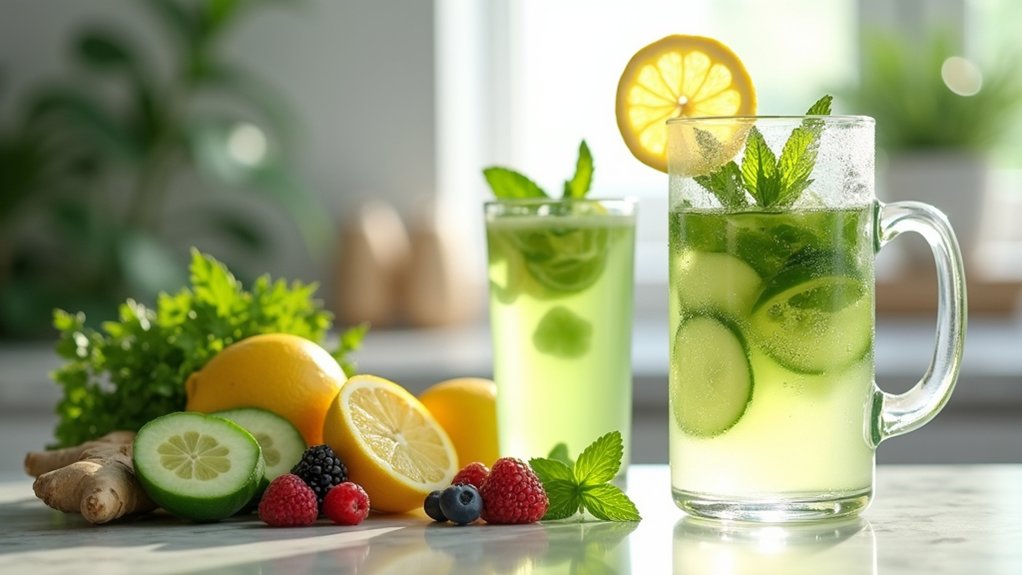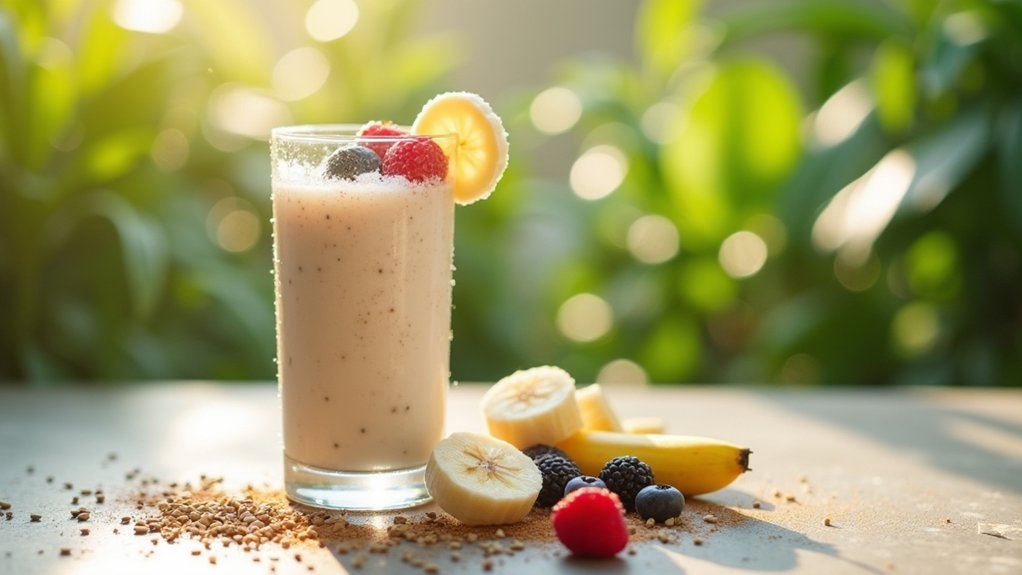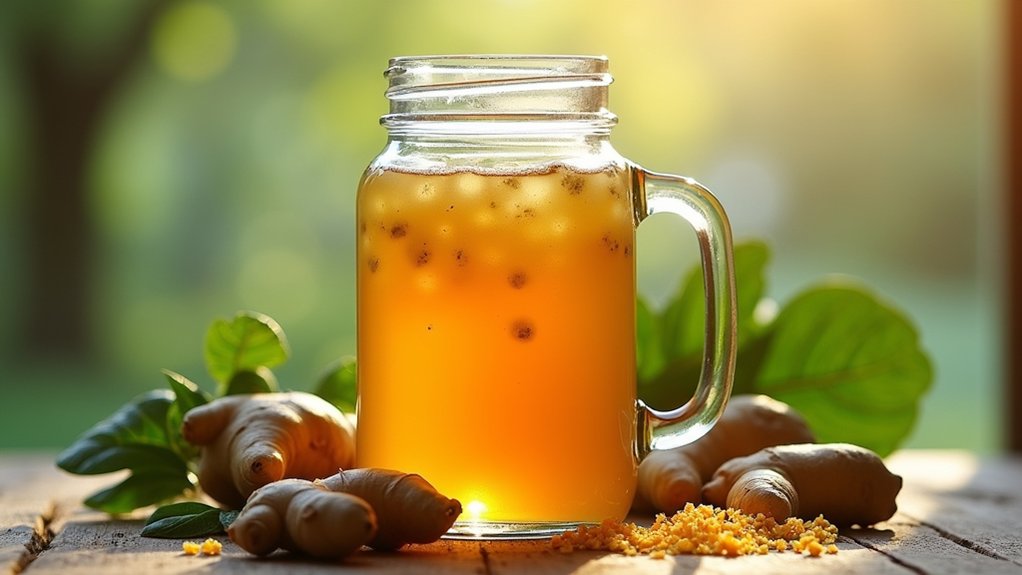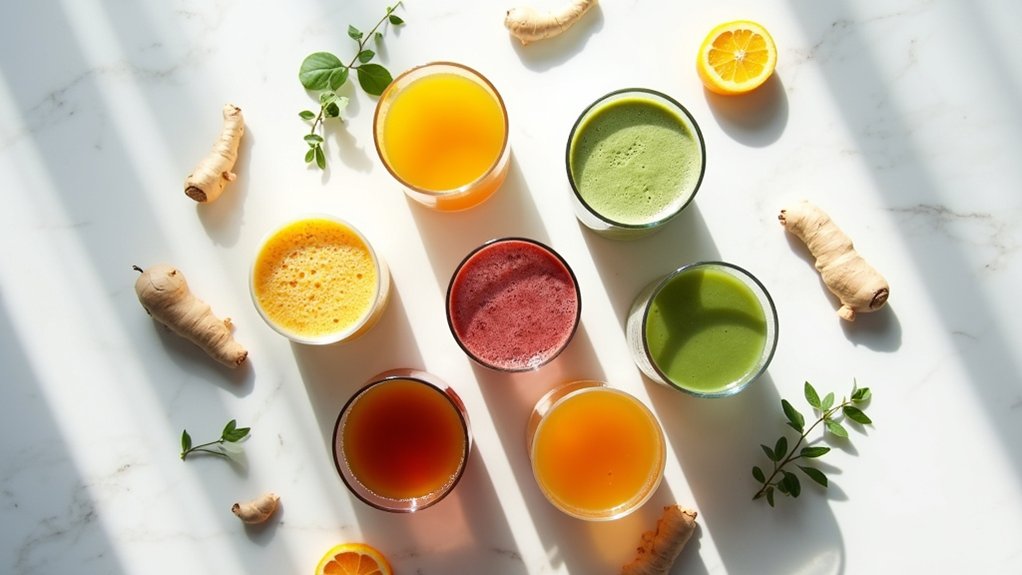During addiction recovery, your body needs targeted nutritional support to heal and reduce cravings. Hydration drinks flush toxins while restoring electrolyte balance disrupted by substance use. Nutrient-dense smoothies with berries and greens deliver antioxidants that repair cellular damage. Protein shakes stabilize blood sugar and rebuild neurotransmitter pathways essential for mental clarity. Probiotic beverages restore gut health and can reduce alcohol cravings by 90%. Green tea and whole grain drinks provide sustained energy while supporting liver detoxification. Understanding how each beverage supports specific recovery processes will help you build an inclusive healing strategy.
Hydration Support Drinks Restore Balance and Flush Toxins

During detox and early recovery, your body works overtime to restore what substance use has depleted, and proper hydration becomes one of your most powerful tools. Rehydration replenishes fluids lost through withdrawal symptoms like vomiting, sweating, and diarrhea, which commonly occur during detox. Water supports your kidneys in flushing drug and alcohol metabolites from your system, accelerating the detox process through natural excretory pathways. Adequate hydration also helps prevent common withdrawal complications like fatigue and dizziness, which can significantly impact your mental state during recovery. Proper hydration additionally supports liver function, enabling this vital organ to process and eliminate toxins more efficiently.
Electrolyte balance restoration is equally critical. Alcohol and stimulant abuse disrupt sodium, potassium, and magnesium levels, increasing risks like seizures and heart complications. Electrolyte-rich drinks, coconut water, sports beverages, and herbal teas help stabilize these minerals while supporting cellular function. Proper hydration can also alleviate withdrawal symptoms like headaches, providing relief during the challenging early stages of recovery. Clinical detox programs carefully monitor fluid and electrolyte status to prevent severe complications, ensuring your body has what it needs to heal safely and effectively.
Nutrient-Dense Smoothies Deliver Essential Vitamins for Tissue Repair
Your body requires specific nutrients to rebuild damaged tissues and restore cellular function during recovery. Leafy greens like spinach and kale contain chlorophyll and essential minerals that support your liver’s natural detoxification pathways, helping eliminate accumulated toxins more efficiently. Berries provide powerful antioxidants such as anthocyanins and vitamin C, which neutralize free radicals and reduce the oxidative stress that can impair healing and prolong recovery symptoms. These nutrient-rich beverages boost immune system function while simultaneously restoring depleted energy levels that substance abuse has compromised. Combining ingredients like avocado with spinach creates smoothies that provide sustained energy and mental clarity essential for navigating the challenges of recovery. These blended drinks also help balance blood sugar levels, preventing the energy crashes and mood swings that can trigger cravings during early sobriety.
Leafy Greens Boost Detoxification
When your body begins the recovery process, leafy greens offer a powerful combination of nutrients that directly support detoxification and tissue repair. Kale, spinach, and bok choy contain chlorophyll that binds toxins while providing vitamins A, C, K, and B6 for immune support and neurotransmitter synthesis. These greens’ antioxidants combat oxidative damage and activate liver detoxification enzymes.
Blending raw leafy greens into smoothies preserves natural enzymes for digestion enhancement and nutrient absorption. The high water content promotes hydration, essential for flushing toxins through your kidneys. Magnesium supports nervous system recovery, while folic acid accelerates cellular regeneration. These nutrient-dense beverages flood the body with micronutrients that substance abuse commonly depletes. Adding cucumber or celery enhances kidney function, and combining greens with citrus fruits improves vitamin absorption. This alkalizing effect balances your body’s pH, creating ideal conditions for healing during your recovery journey. Dark leafy greens like collard greens provide calcium for bone health, which can be compromised during prolonged substance use. Including whole grains with leafy greens creates balanced recovery drinks that deliver sustained energy release throughout the day.
Berries Combat Oxidative Stress
Because oxidative stress accelerates cellular damage throughout recovery, berries function as therapeutic allies through their concentrated anthocyanins and phenolic acids. You’ll find that vitamins C, A, and E work alongside these polyphenols to neutralize free radicals damaging your proteins, DNA, and lipids during healing.
Research demonstrates that regular berry consumption reduces oxidative biomarkers like malondialdehyde and oxidized LDL, though individual responses vary. What’s particularly valuable are the synergistic benefits; whole berries outperform isolated supplements because multiple compounds interact to enhance absorption rates and cellular protection. Studies examining chronic berry consumption have measured effects over periods ranging from 4 to 12 weeks, providing evidence for sustained antioxidant benefits.
Your brain especially benefits from these antioxidants, as its high oxygen demand makes it vulnerable to oxidative injury. Berry polyphenols improve neuronal communication while reducing neuroinflammation, supporting cognitive function that substance abuse compromised. You’re simultaneously strengthening antioxidant enzymes like glutathione and superoxide dismutase. Beyond cognitive benefits, eating berries enhances motor control by improving how brain neurons communicate with each other. No unwanted toxic effects have been associated with berry consumption, making them a safe addition to your daily recovery routine.
Protein Recovery Shakes Stabilize Energy and Brain Chemistry

During early recovery, your body struggles with depleted energy reserves, unstable moods, and intense cravings, all stemming from the biochemical chaos that substance abuse leaves behind. Protein recovery shakes offer targeted nutritional support by delivering amino acids that rebuild neurotransmitter pathways, particularly dopamine and serotonin production. These drinks stabilize blood sugar levels, preventing the crashes that trigger relapse vulnerability. When considering protein powder selection, prioritize whey, pea, or hemp varieties that provide complete amino acid profiles. Blend with Greek yogurt, nut butter, or seeds to enhance nutritional density. Daily protein intake goals for recovery typically range from 0.8 to 1.2 grams per kilogram of body weight. Since your body does not store protein, maintaining consistent intake throughout the day becomes essential for continuous repair. Consuming protein shakes between meals maintains steady energy release, reduces sugar dependence, and supports liver repair while strengthening your immune system during this critical healing phase. Protein is essential for cell replacement and regeneration, making it particularly vital for repairing addiction-related damage throughout your body. Adding omega-3 rich ingredients like walnuts or chia seeds to your protein shakes supports brain cell repair and often improves focus and mood.
Antioxidant Beverages Combat Oxidative Stress and Boost Immunity
Your body faces significant oxidative stress during recovery, as chronic substance use has depleted your natural defenses and left cells vulnerable to damage. Antioxidant-rich beverages like green tea and berry juices can help neutralize harmful free radicals while supporting your immune system’s ability to heal. These drinks provide concentrated sources of polyphenols, catechins, and vitamins that work at the cellular level to reduce inflammation and restore balance during detoxification. Vitamin E protects cells from damage caused by substance abuse and helps manage the oxidative stress your body experiences during the recovery process.
Green Tea Cellular Protection
When your body faces oxidative stress from intense exercise, environmental toxins, or daily inflammation, green tea’s polyphenols act as a sophisticated cellular protection mechanism. Epigallocatechin gallate benefits include direct free radical neutralization and enhanced antioxidant enzyme activity throughout your system.
| Protection Level | Mechanism | Cellular Impact |
|---|---|---|
| DNA | UV radiation defense | Prevents strand damage |
| Membrane | Lipid peroxidation inhibition | Maintains structural integrity |
| Protein | Oxidation prevention | Preserves enzyme function |
| Immune | Glutathione production | Supports cellular response |
| Mitochondrial | Oxidative stress reduction | Enhances energy production |
Your cells receive multi-layered defense as catechins scavenge harmful oxidants, inhibit inflammatory enzymes, and chelate metal ions that would otherwise catalyze damaging reactions. Even metabolized tea compounds retain protective properties, offering sustained cellular support during recovery.
Berry Juices Reduce Inflammation
Berry juices deliver concentrated anthocyanins that directly suppress your body’s inflammatory machinery at the molecular level. When you consume blackcurrant, lingonberry, or blueberry juice, you’re inhibiting COX-2 enzymes and blocking NF-κB activation, key drivers of chronic inflammation. These polyphenols reduce pro-inflammatory cytokines while neutralizing reactive oxygen species that damage your healing cells.
Your phytonutrient absorption from berry juices improves antioxidant capacity within hours, with studies showing 45% reductions in oxidative stress markers. Regular consumption lowers C-reactive protein and supports endothelial function improvement, protecting your cardiovascular system during recovery. Blackcurrant and cranberry varieties demonstrate particularly strong vascular-protective effects. Clinical trials report decreased pain perception and enhanced physical recovery after 12 weeks of berry supplementation, supporting your body’s natural repair processes during addiction healing.
Gut-Healing Drinks Rebuild Digestive Health and Microbiome

During active addiction, alcohol and drugs systematically dismantle your gut’s protective barriers and devastate the delicate bacterial communities that regulate everything from nutrient absorption to mood stability. Probiotic-rich beverages like kefir and kombucha directly replenish these depleted microbial populations with live Lactobacillus and Bifidobacterium strains that demonstrate measurable improvements in liver function and gut barrier protection.
Research shows daily probiotic supplementation at 1.8×10^9 CFU reduces depression while improving cholesterol, glucose, and inflammatory markers in recovering individuals. Some formulations reduce alcohol cravings by 90% within fifteen days. Since your gut produces 90% of your body’s serotonin, restoring beneficial bacteria through fermented drinks supports improved digestion and mood regulation simultaneously. Lactobacillus rhamnosus GG specifically enhances dopamine pathways, helping decrease consumption urges while your microbiome rebuilds itself.
Whole Grain-Based Drinks Provide Sustained Energy and B Vitamins
While rebuilding your microbiome addresses one foundational element of physical recovery, your body’s ability to sustain energy throughout the day depends equally on stable fuel sources that won’t trigger the blood sugar rollercoaster that intensifies cravings.
Whole grain-based drinks deliver complex carbohydrates that release glucose gradually, supporting metabolic regulation and preventing energy crashes. Their micronutrient density makes them particularly valuable; you’re getting B vitamins like thiamine, niacin, and folate that directly repair nerve damage and restore cellular energy production.
Consider oat-based smoothies, brown rice beverages, or quinoa blends. These drinks provide fiber that slows digestion, minerals supporting immune function, and antioxidants combating oxidative stress. The B vitamins specifically address deficiencies common in substance use disorder, helping reduce anxiety, irritability, and depression while promoting cognitive focus essential for rehabilitation adherence.
Electrolyte and Mineral-Rich Beverages Support Cellular Recovery
Your body’s cellular machinery can’t function ideally without adequate electrolytes, the charged minerals that regulate everything from nerve signaling to muscle contraction. Substance use frequently depletes sodium, potassium, magnesium, and calcium, compromising your recovery. Essential mineral repletion through electrolyte-rich beverages supports detoxification by enhancing kidney function and toxin elimination. These drinks reduce withdrawal symptoms like fatigue and headaches while promoting tissue regeneration.
Natural options, coconut water, diluted lemon juice with sea salt, provide electrolyte absorption enhancement without added sugars. Potassium restores heart and muscle function, magnesium regulates mood and sleep, and calcium supports nerve transmission. Combining electrolyte beverages with B-complex and vitamin C further strengthens cellular recovery and antioxidant defense. Proper hydration normalizes brain signals that may otherwise trigger cravings, while supporting liver function during toxin processing and promoting emotional stability throughout your healing journey.
Frequently Asked Questions
Can Recovery Drinks Replace Meals During Early Stages of Addiction Healing?
Recovery drinks shouldn’t replace meals during early addiction healing. While they’re convenient supplements that help manage energy level fluctuations between structured eating times, you’ll need whole foods to relearn hunger cues and establish sustainable habits. Mood stabilization strategies work best when you’re consuming regular balanced meals alongside supplemental drinks. Your body needs the complete nutritional profile and digestive benefits that only whole foods provide. Think of recovery drinks as supportive tools, not meal substitutes, in your healing journey.
How Soon After Quitting Substance Use Should Recovery Drinks Be Introduced?
You should wait until your acute withdrawal symptoms ease before introducing recovery drinks, typically after the first week. The ideal timing depends on when you can tolerate food and beverages without significant nausea or GI distress. Start with a gradual introduction once your appetite stabilizes, usually in week two. This approach guarantees you’ll actually absorb the nutrients and stay hydrated. Always consult your healthcare provider, as individual withdrawal timelines vary based on the substance used.
Are There Specific Drinks to Avoid During Addiction Recovery Programs?
You’ll want to avoid alcoholic beverages entirely, as they markedly increase relapse risk through dopamine effects that mirror your original substance use. Sugary sodas should also be limited, while you might crave sugar during early recovery, these drinks deplete essential nutrients your body needs for healing. High-caffeine beverages can overstimulate your system and worsen anxiety. Mocktails may trigger psychological associations with drinking, so approach them cautiously based on your individual recovery journey.
Can Recovery Drinks Interfere With Medications Prescribed for Addiction Treatment?
Yes, recovery drinks can interfere with your addiction medications through medication interactions. Herbal ingredients, stimulants, or even trace alcohol may alter how your body metabolizes drugs like buprenorphine, naltrexone, or antidepressants. These interactions can reduce effectiveness or increase side effects. Always share what you’re drinking with your healthcare provider for proper dosage monitoring. Transparency helps safeguard your treatment plan works safely together. You’re not being overly cautious; you’re protecting your recovery.
How Many Recovery Drinks Should Be Consumed Daily for Optimal Results?
You’ll typically benefit from 1–2 recovery drinks daily, spaced evenly with meals or snacks. Ideal serving sizes range from 8–12 oz, depending on whether it’s a protein shake, probiotic smoothie, or nutrient blend. Daily timing of consumption matters; align drinks with breakfast or as a mid-afternoon snack to stabilize energy and curb cravings. Always consult your healthcare provider to personalize frequency and portions based on your unique recovery needs and medication regimen.










